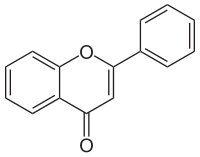
Photo from wikipedia
Abstract We explored the anticancer activity of two synthetic flavonoid-based small molecules, HMDC and HMDF, with bioactive methylenedioxy functionality. HMDF inhibited the proliferation of the p53 wild-type (NCIH460 and A549),… Click to show full abstract
Abstract We explored the anticancer activity of two synthetic flavonoid-based small molecules, HMDC and HMDF, with bioactive methylenedioxy functionality. HMDF inhibited the proliferation of the p53 wild-type (NCIH460 and A549), and p53 null (NCIH1299) non-small cell lung cancer and breast cancer (MCF-7) cells more potently than HMDC without significant cytotoxic effects on the normal lung-epithelial (L132) and macrophage (Raw 264.7) cells. HMDF mediated reduction of the cell proliferation occurred due to its attachment at the p53-binding domain of MDM2 (also evident from molecular docking analysis), which induced the disruption of the p53-MDM2 interactions. Ultimately, a higher expression of p53 in the NCIH460 cells was observed. The up-regulated p53 level instigated apoptosis of cancer cells. However, MDM2 expression level remained unaltered. The docking studies further indicate that HMDF can suppress the anti-apoptotic activity of Bcl-2 protein by blocking its BH3 domain.
Journal Title: Journal of Molecular Structure
Year Published: 2022
Link to full text (if available)
Share on Social Media: Sign Up to like & get
recommendations!